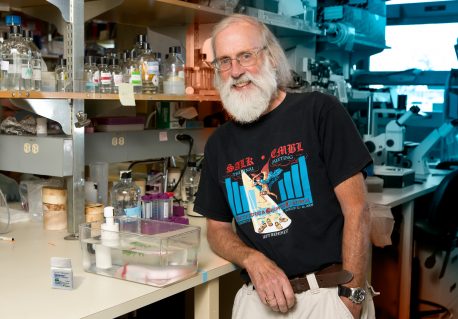
February 14, 2017
LA JOLLA—Salk Professor Tony Hunter, who holds an American Cancer Society Professorship, has been awarded $500,000 as part of the $1 million Royal Swedish Academy of Sciences' inaugural Sjöberg Prize for Cancer Research for "groundbreaking studies of cellular processes that have led to the development of new and effective cancer drugs." The prize ceremony, which is modeled after the Nobel Prize ceremony, will be held in Stockholm during the Academy's annual meeting on March 31, 2017, in the presence of His Majesty the King and Her Majesty the Queen of Sweden.

Click here for a high-resolution image.
Credit: Salk Institute
"Tony is an internationally recognized leader in the field of cancer research," says Salk President Elizabeth Blackburn. "He has made enormous contributions to our understanding of cancer's basic biology and his research has led to life-saving therapies. We are delighted that his pioneering accomplishments are being honored with this important new award."
Hunter studied how normal cells become tumor cells, demonstrating that a special process was necessary: tyrosine phosphorylation of proteins. His discovery led to the development of a new type of cancer pharmaceutical, tyrosine kinase inhibitors. These have revolutionized the treatment of chronic myeloid leukemia and also are of great benefit in several other forms of cancer. Hunter’s work has led to a complete catalogue of the 90 human genes that encode tyrosine kinases, over half of which have become targets for the development of drugs to treat cancer and other human diseases. Currently, 26 tyrosine kinase inhibitors are FDA approved for human therapy, with many more in clinical trials.
"It is a great honor to have been selected as an inaugural recipient of the Sjöberg Prize," says Hunter. "I have been fortunate to work in an inspiring and collaborative scientific community both at Salk and around the world, with excellent mentors, colleagues and students, all of whom contributed greatly to the breakthrough for which I am being honored."
"I so clearly remember the floor meeting, some 40 years ago, where Tony first announced the phosphorylation of tyrosine by Rous sarcoma viral Src kinase,” says Inder Verma, Salk professor. “It was thrilling at the time and now it is amazing to think that this finding has led to the making of drugs which are saving and extending the lives of cancer patients worldwide. That is the magic of basic science."
The annual prize, which includes $100,000 as a personal award with $900,000 U.S. dollars designated as a grant for future research, is shared equally by the awardees. Hunter shares the honor with immunologist James P. Allison of the University of Texas MD Anderson Cancer Center, whose work on the white blood cells known as T cells led to the development of immune checkpoint therapy drugs that promote the immune response to cancer, and are now widely used in cancer therapy.
Hunter, who holds the Renato Dulbecco Chair in Salk's Molecular and Cell Biology Laboratory, is also the recipient of the BBVA Foundation Frontiers of Knowledge award in biomedicine, the Royal Medal in the Biological Sciences of the Royal Society, the Wolf Prize in Medicine and the Gairdner International Award, among other prestigious honors. He is a member of the National Academy of Sciences, the National Academy of Medicine and the American Academy of Arts and Sciences. Born in 1943 in Ashford, Kent, in the United Kingdom, Hunter is also a fellow of the Royal Society of London.
The Sjöberg Prize is awarded by the Sjöberg Foundation, which was established in 2016 with a donation of $2 billion Swedish krona by the late Swedish businessman Bengt Sjöberg—one of the biggest donations in Swedish history. The annual prize totals $1 million U.S. dollars and is shared equally between the laureates, who are chosen by the Royal Swedish Academy of Sciences. The laureates will hold open lectures at the Karolinska Institutet on March 30.
About the Royal Swedish Academy of Sciences:
The Royal Swedish Academy of Sciences was founded in 1739 and is an independent organization that aims to promote the sciences and strengthen their influence in society. The Academy takes special responsibility for the natural sciences and mathematics, but strives to increase the exchange between different disciplines.
About the Salk Institute for Biological Studies:
Every cure has a starting point. The Salk Institute embodies Jonas Salk’s mission to dare to make dreams into reality. Its internationally renowned and award-winning scientists explore the very foundations of life, seeking new understandings in neuroscience, genetics, immunology, plant biology and more. The Institute is an independent nonprofit organization and architectural landmark: small by choice, intimate by nature and fearless in the face of any challenge. Be it cancer or Alzheimer’s, aging or diabetes, Salk is where cures begin. Learn more at: salk.edu.
Office of Communications
Tel: (858) 453-4100
press@salk.edu